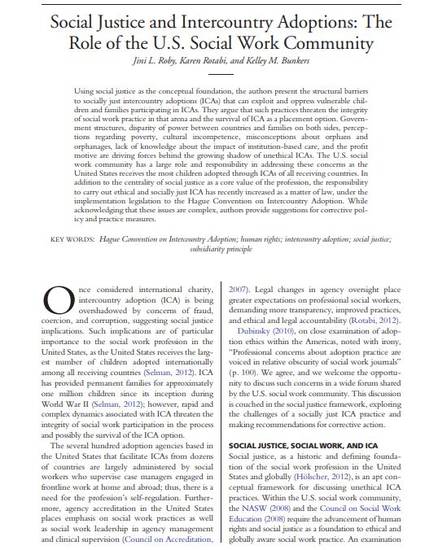
Article
Social Justice and Intercountry Adoptions: The Role of the U.S. Social Work Community
Social Work
(2013)
Abstract
Using social justice as the conceptual foundation, the authors present the structural barriers to socially just intercountry adoptions (ICAs) that can exploit and oppress vulnerable children and families participating in ICAs. They argue that such practices threaten the integrity of social work practice in that arena and the survival of ICA as a placement option. Government structures, disparity of power between countries and families on both sides, perceptions regarding poverty, cultural incompetence, misconceptions about orphans and orphanages, lack of knowledge about the impact of institution-based care, and the profit motive are driving forces behind the growing shadow of unethical ICAs. The U.S. social work community has a large role and responsibility in addressing these concerns as the United States receives the most children adopted through ICAs of all receiving countries. In addition to the centrality of social justice as a core value of the profession, the responsibility to carry out ethical and socially just ICA has recently increased as a matter of law, under the implementation legislation to the Hague Convention on Intercountry Adoption. While acknowledging that these issues are complex, authors provide suggestions for corrective policy and practice measures.
Keywords
- Hague Convention on Intercountry Adoption,
- human rights,
- intercountry adoption,
- social justice,
- subsidiarity principle
Disciplines
Publication Date
October, 2013
DOI
10.1093/sw/swt033
Citation Information
Jini L. Roby, Karen Rotabi and Kelley M. Bunkers. "Social Justice and Intercountry Adoptions: The Role of the U.S. Social Work Community" Social Work Vol. 58 Iss. 4 (2013) p. 295 - 303 Available at: http://works.bepress.com/karen-rotabi/17/
